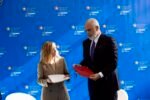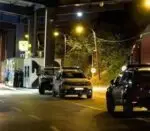Russian Foreign Minister Sergey Lavrov made controversial comparisons between Kosovo and Crimea during an interview with U.S. extreme right-wing personality Tucker Carlson at the Kremlin. Lavrov used the opportunity to criticize U.S. foreign policy, drawing parallels between the two regions in terms of self-determination and international recognition.
When asked about the situation in neighboring countries and whether the U.S. was complicating conflict resolution, Lavrov responded with sharp criticism of the United States’ historical foreign policy. He pointed to U.S. involvement in Iraq, Libya, and Afghanistan, suggesting that American foreign policy often creates problems only to later exploit them.
Lavrov’s comments focused on the inconsistency he perceives in how the West, particularly the U.S., handles international conflicts. “The U.S. historically has been motivated by creating problems and then seeing how they can exploit them,” he stated, referencing U.S. interventions and their aftermaths.
He also discussed the OSCE’s role in election monitoring, stating that the organization would only issue positive reports when the results aligned with Western interests, citing the recent monitoring mission in Georgia.
However, the most controversial part of Lavrov’s interview was his comparison of Kosovo’s unilateral declaration of independence with Crimea’s 2014 referendum. He highlighted that while Kosovo’s declaration of independence was recognized by Western countries without a referendum, Crimea’s referendum was dismissed as a violation of territorial integrity. Lavrov insisted that both situations should be treated equally under international law.
“There was no referendum in Kosovo when it declared independence, but they said it was self-determination,” Lavrov explained. “Then, years later, Crimean citizens held a referendum with many international observers. But Western countries refused to accept it, citing violations of territorial integrity.”
Lavrov’s statements align with Russia’s stance on both Kosovo and Crimea, as Russia has consistently supported Kosovo’s lack of recognition and justified its annexation of Crimea, arguing that both cases involved legitimate self-determination efforts.
The Russian foreign minister’s remarks underscore the ongoing tension between Russia and the West, as well as the complex geopolitical disputes surrounding territorial integrity and self-determination.







